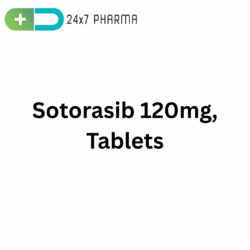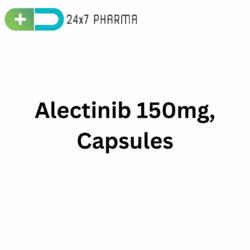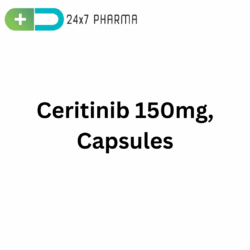LuciPral 100mg, Pralsetinib Capsules
LuciPral 100mg contains the active ingredient Pralsetinib, a targeted cancer therapy developed to treat specific types of cancers that harbor RET (Rearranged during Transfection) gene alterations. Manufactured to offer precision medicine benefits, LuciPral is primarily used in the treatment of RET fusion-positive non-small cell lung cancer (NSCLC) and RET-mutant medullary thyroid cancer (MTC). Oncology has advanced significantly with its approval, especially for patients who have few options for targeted therapy.
What is LuciPral 100mg (Pralsetinib)?
LuciPral is an oral tyrosine kinase inhibitor (TKI) specifically designed to inhibit RET kinase activity. Lung and thyroid tumors are among the many cancer forms for which RET mutations are recognized oncogenic drivers. Adult patients with RET-mutant or RET-fusion-positive thyroid tumors and RET-fusion-positive non-small cell lung cancer are prescribed 100 mg of LuciPral.
How LuciPral Works / Mechanism of Action
Pralsetinib works by selectively inhibiting RET receptor tyrosine kinases, which are involved in cell growth and division. RET gene fusions and mutations cause abnormal signaling that drives cancer cell proliferation and survival. By binding to the ATP-binding pocket of the RET kinase, Pralsetinib inhibits its activity, thereby halting cancer progression and inducing cancer cell death.
This selective mechanism minimizes off-target effects on other kinases, leading to a more tolerable safety profile compared to non-selective inhibitors.
How to Use / Indications
The following conditions can be treated with 100 mg of LuciPral:
- adults with non-small cell lung cancer (NSCLC) that has spread and is RET fusion positive.
- Adults and adolescents aged ≥12 who have progressed or metastatic RET-mutant medullary thyroid cancer (MTC) require systemic therapy.
- When appropriate, RET fusion-positive thyroid carcinoma that is resistant to radioactive iodine (RAI).
- This therapy is generally prescribed based on genetic testing that confirms RET mutations or fusions.
How to Take / Dosage
The usual recommended dose of LuciPral is:
- 400 mg once daily, which equals four 100 mg capsules taken orally on an empty stomach.
- Important: Avoid food intake for at least 2 hours before and 1 hour after taking the dose.
- Capsules should be swallowed whole, not crushed or chewed. Patients are advised to take the dose at the same time each day for consistent drug levels in the body.
Other Dosage Considerations
- Dose Modifications: Required in cases of adverse reactions such as hypertension, hepatotoxicity, or hematological toxicities.
- Renal Impairment: No dose adjustment recommended for mild/moderate cases. Data for severe renal impairment is limited.
- Hepatic Impairment: Mild impairment requires no adjustment; caution is advised in moderate/severe cases.
Always follow your oncologist’s specific recommendations and regular monitoring protocols.
Side Effects
Like all cancer therapies, LuciPral 100mg may cause side effects. Some common and serious side effects include:
Common Side Effects:
- Constipation
- Hypertension
- Fatigue
- Musculoskeletal pain
- Diarrhea
- Anemia
- Rash
Serious Side Effects:
- Interstitial Lung Disease (ILD) or pneumonitis
- Hypertensive crisis
- Hepatotoxicity
- Bleeding events
- QT interval prolongation
- Neutropenia or thrombocytopenia
- Patients should report any difficulty breathing, unexplained bruising, liver symptoms (jaundice, dark urine), or chest pain immediately.
Storage
- Keep it between 15°C and 30°C (59°F and 86°F) at room temperature.
- To keep it safe from light and moisture, keep it in its original container.
- Keep out of children’s and pets’ reach.
- Never use after the label’s specified expiration date.
Benefits
- Targeted Therapy: Specifically inhibits RET kinase with fewer off-target effects.
- High Response Rate: Demonstrated clinical activity in both treatment-naïve and previously treated patients.
- Oral Administration: Convenient daily oral dosage improves compliance.
- Rapid Onset of Action: Shows tumor shrinkage in a short time in many patients.
- Personalized Medicine: Enhances outcomes in patients with confirmed RET alterations.
Prescription
LuciPral 100mg is a prescription-only medicine (Rx). It must be prescribed by an oncologist or physician experienced in cancer therapy, following molecular diagnostic testing confirming RET gene involvement.
Before initiating LuciPral, patients are typically evaluated for:
- Complete blood count (CBC)
- Liver function test (LFTs)
- ECG (if risk of QT prolongation exists)
- Pregnancy test in women of childbearing potential
Drug Interactions
LuciPral interacts with several drugs and substances. Key interactions include:
CYP3A Inhibitors and Inducers:
- Avoid strong CYP3A inducers (e.g., rifampin, St. John’s Wort), which can reduce pralsetinib levels.
- Use caution with CYP3A inhibitors (e.g., ketoconazole), which may increase plasma levels of pralsetinib.
- Acid-Reducing Agents:
- Proton pump inhibitors (PPIs) and H2 receptor antagonists may reduce the bioavailability of Pralsetinib.
QT-Prolonging Drugs:
- Heart rhythm issues may become more likely with concurrent use.
- Patients should disclose all medications, including herbal and OTC drugs, to their doctor before starting LuciPral.
FAQs
Is LuciPral a chemotherapy drug?
No, LuciPral is a targeted therapy, not traditional chemotherapy. It specifically targets the RET gene.
Can LuciPral be use during pregnancy?
No. Pralsetinib may harm an unborn baby. Women of childbearing age should use effective contraception during treatment and for at least 1 week after the last dose.
What tests are needed before starting LuciPral?
RET gene testing, blood work (CBC, liver tests), and possibly an ECG are required before starting therapy.
Conclusion
The treatment of RET-driven malignancies has advanced significantly with the introduction of LuciPral 100mg (Pralsetinib). With its selective targeting of RET mutations and fusions, it provides an effective and well-tolerated option for patients with advanced NSCLC and thyroid cancers. As a personalized medicine, its use underscores the importance of molecular diagnostics in modern oncology. Patients fighting RET-altered cancers now have hope thanks to the innovative medication LuciPral.









